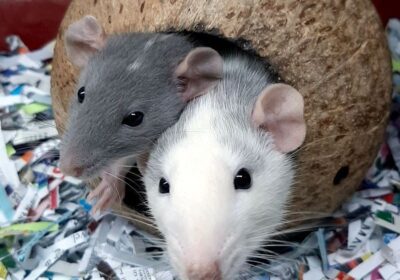Rats
The Animal Rescue League adopts rats to be family pets. Under no circumstances should a rat be used for food for other animals; for experimentation or laboratory work; or for any other use other than as a family pet. The ARL strictly enforces this policy under the terms of the adoption contract.

Important Facts about Rats
Rats are highly intelligent creatures that form a close bond with their handlers. With patience, they can be taught to recognize their name and other fun things such as playing peek-aboo, tug-of-war and hide and seek. When given frequent and ample attention, rats will rarely bite. Rats also do well in the company of other rats whether from a young age or introduced once mature, and due to their social nature should always be kept with another (same sex) rat for company.
Some signs that may indicate ill health for rats are: sneezing, wheezing, rattling, thin condition, ruffled stand-up coat, hunched posture, listlessness, discharge from eyes or nose, diarrhea, bloated belly and cuts or open wounds. If you notice any of these signs you should see your veterinarian immediately.
Well socialized rats are easily picked up using both hands to support their body. They enjoy handling and exploring and rarely bite. They should not be picked up by their tails.
Regularly check eyes, nose, ears, teeth, weight, and droppings.
- Most rats live between two to three years, but can live as long as six years with proper care. The majority, however, die young from cancer (something they inherited from years of laboratory breeding).
- Rats will do well on commercial rat pellets along with occasional supplements of vegetables, fruit, dried bread and other healthy tidbits.
- Rats cannot vomit and thus they are careful about what they eat.
- Rats need fresh water daily.
- Rats need access to good quality veterinary care.
- Rats are not dirty. They constantly groom themselves.
